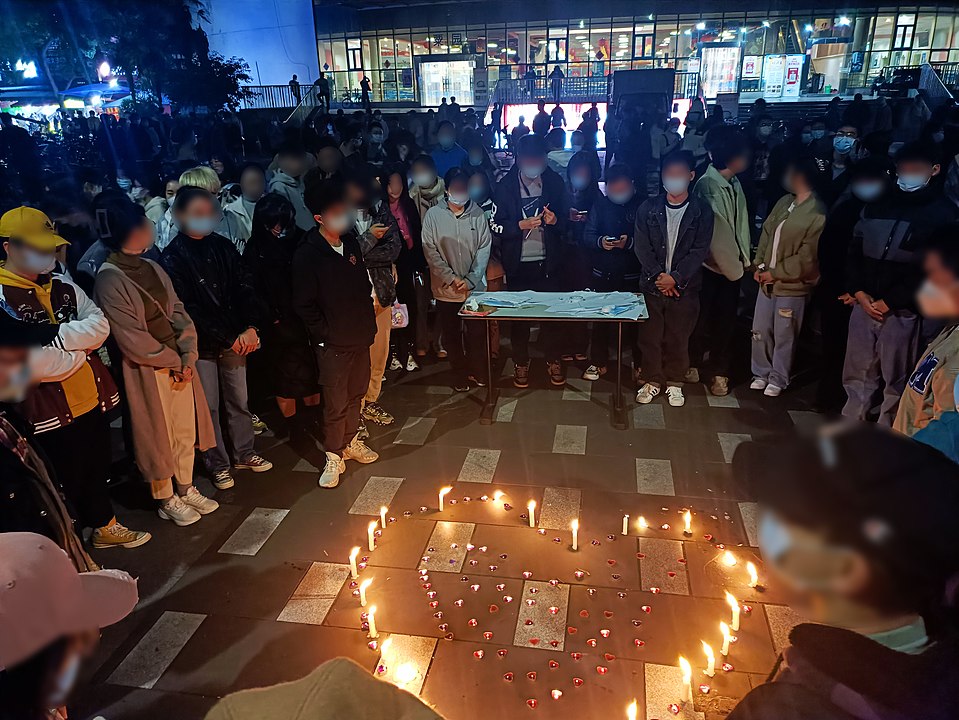Solidarity statement with protests in China

Over the past weekend [November 26 & 27 – Eds.] major Chinese cities such as Urumqi, Shanghai, Nanjing, Chengdu, Wuhan, Guangzhou, Beijing, and over 50 universities —including elite institutions —were rocked by riots, mass demonstrations, and vigils. A protest movement on this scale and with such overtly political demands as “freedom” and “democracy” has not been seen in China for several decades, and we on the international left should pay close attention to its development and offer solidarity.

In the past few days, people have been driven to the street by anger and indignation over the death of at least ten people (with more injured, including both Han and Uyghur Chinese) in Urumqi, the capital of Xinjiang province. The deaths were caused by a fire that raged through several floors of a high-rise residential building for three hours before being extinguished. Residents believed the delay in rescue was caused, in part, by the lockdown of the residential community that restricted the movement of emergency responders.
This is the last straw for a public that has been under increasingly draconian and arbitrary Covid lockdowns in recent months. These have harmed people’s livelihood, especially working-class people with little savings, and in some cases resulted in unnecessary death. State support for the capitalist exploitation of Chinese workers at Foxconn, by means of locking them inside the electronics production facility, is another enraging example of the cruelty of this policy. While the lockdowns in the early stage of the pandemic certainly saved lives in China and had broad public support, people have grown wary and no longer believe this is the most humane or effective way to deal with Covid. But their voices have been ignored, and their complaints on social media censored, as they live in one of the most surveilled countries in the world.
Finally, public discontent that has accumulated for months spilled onto the streets. Over the weekend, the protests escalated and embodied broad demands, reflecting the cross-class nature of the movement. Protesters chanted a range of slogans demanding, “lifting restrictions,” “freedom,” “democracy,” “dignity,” “end to dictatorship,” “rule of law,” “freedom of speech,” and in the more extreme cases demanding “CCP step down” and “Xi Jinping step down,” showing both the shared and divergent concerns of the protesters in mass demonstrations. In the main, however, the calls are not for the downfall of the government, but for its democratization; calls for the government to listen to the voices and needs of the people. These are by no means socialist demands, but in the Chinese context, they are progressive – and from the perspective of the state, subversive — demands that will be met with suppression. Indeed, the government has already started to detain and harass protesters and set up barriers around key protest sites and public spaces to keep protesters away.
More than just the lockdown, what motivates these protests is people’s sense of not being heard in a political system that so arrogantly disregards popular opinions. This sense of alienation from the political system has been further strengthened as Xi Jinping eliminated term limits and secured his third term as the Party Secretary. This explains the political demands for democracy.
To avoid the mass infections that may result from removing the Covid restrictions, will require both a higher vaccination rate and more effective vaccines. It will also require more investment in the healthcare system to improve equal access and better care. But it is not for us, outside of China, to determine for the people of China whether and how to ease the Covid restrictions which affect their lives in ways we do not experience. And unlike the right-wing anti-lockdown and anti-vaxxers in the U.S., Europe, and elsewhere, the Chinese public did not deny the existence of the virus or its impact on people’s health, nor did they challenge the need for vaccination. They should not be likened to right-wing movements in the West, and we should reject attempts to portray the protesters in this way in order to discredit them.
Demonstrating our solidarity with the protesters in China should not be controversial. Unfortunately, there has been either complete silence, or very reluctant acknowledgement from parts of the left that have in the past defended or deflected criticisms of the Chinese state, and by extension, its authoritarian capitalist system. When people in China are rising up against a brutal, inhuman party dictatorship, we cannot remain silent, or worse, make light of the protest movement or dismiss its significance. As socialists and internationalists, we should support every indication in these protests of outright opposition to the ruling regime in China and aspirations for democracy.
People in China, as in many other places in the world today, are demanding a more just and fair government and society – democracy, in other words. A democratic system in China, one in which the people, not a self-aggrandizing elite, are in charge, is also critical to fighting against imperialism of all varieties and addressing the environmental and climate crisis the system creates. From a principled internationalist socialist position, we express our solidarity with the people participating in the demonstrations and their aspirations.
Featured Image Credit: Photo by Date20221127. Image modified by Tempest.
Categories
We want to hear what you think. Contact us at editors@tempestmag.org. And if you've enjoyed what you've read, please consider donating to support our work:
Donate